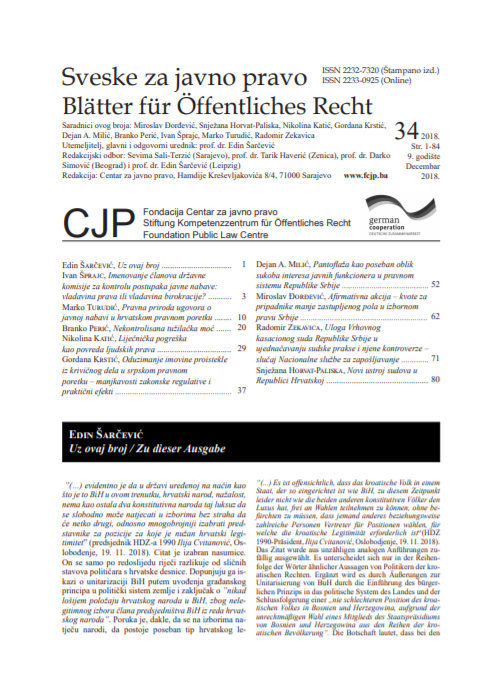Afirmativna akcija – kvote za pripadnike manje zastupljenog pola u izbornom pravu Srbije
Affirmative Action – Gender Quotas in Serbian electoral legislation
Author(s): Miroslav ĐorđevićSubject(s): Gender Studies, Public Law, Electoral systems, Social differentiation
Published by: Fondacija Centar za javno pravo
Keywords: Serbian electoral legislation; gender quotas; women; gender discrimination;
Summary/Abstract: Serbian Law on the election of MPs was amended in 2011 with the introduction of gender quotas that serve to ensure that at least one third of MPs are women. However, the necessity of such affirmative measures can be disputed. The number of female MPs, as well as women holding other positions of power, has been rapidly growing over the past couple of decades without any special treatment and that tendency seems to persist. The present percentage of women in parliament reached 36, 8%, which is fairly high compared to the most other countries. It is also higher than the quota requirements. Also, statistics show that there is no gender discrimination concerning access to high education and that women surpass men when highly qualified occupations are in question. However, there are still aspects of the right to work in which discrimination is possibly taking place and that is something what should be the focus of future fight for gender equality. Electoral gender quota system is not only practically redundant, but its constitutionality is also in question. The author analyses the gender quota system from the theoretical perspective, confronting it with the idea of the parliament as the representative of the political will of the people. Although Serbian Constitution allows measures of affirmative action to be introduced, it also sets the requirements for such action. In this paper the fulfillment of those requirements is analyzed, leading to conclusion that the constitutionality and the reason itself of such quota system in today’s Serbia is doubtful. The goals of removing gender discrimination in this area are met not due to affirmative measures, but the will and success of women themselves. Author also briefly shows the historical development of today’s gender relations, concerning voting rights, gives comparative context and tries to point out the directions where the fight against gender discrimination should be taken next.
Journal: Sveske za javno pravo
- Issue Year: 9/2018
- Issue No: 34
- Page Range: 62-70
- Page Count: 9
- Language: Serbian

